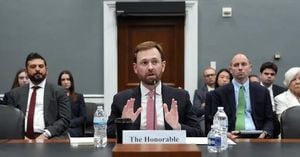In a rapidly shifting landscape across the United States, the debate over vaccine mandates and eligibility has reignited fierce political and public health battles, with states taking divergent paths in response to sweeping federal changes. The latest flashpoint came in late August 2025, when the U.S. Food and Drug Administration (FDA) approved new COVID-19 vaccines for the fall but restricted eligibility to people 65 and older and those at high risk for severe disease. This marked a stark departure from previous guidance, which had made vaccines available to anyone 6 months or older, and sent shockwaves through state governments, advocacy groups, and medical communities alike.
According to Reuters, Florida Governor Ron DeSantis and Surgeon General Joseph Ladapo announced plans on September 3 to end all vaccine mandates in the state, including requirements for grade-school children. Ladapo, who has become a lightning rod in national health debates, declared at a press conference that he aimed to “wipe all of them, every last one of them, off the books.” He went so far as to compare vaccine mandates to slavery, questioning, “Who am I to tell you what should be in your child’s body? I don’t have that right. Your body is a gift from God.”
Ladapo’s stance is not new. Since his appointment during the COVID-19 pandemic, he has frequently issued guidance at odds with federal authorities, and earlier this year, he was even considered by the Trump administration for the role of CDC director, as reported by BBC News. President Donald Trump and Health Secretary Robert F. Kennedy Jr. have both advocated for sweeping changes to national vaccine and immunization policies, a push that has emboldened conservative states to challenge federal norms.
But Florida is not alone in this rebellion. A wave of states, including Colorado, Massachusetts, New Mexico, New York, and Pennsylvania, announced this week that they would break with the FDA’s restrictive eligibility policies for the newly approved COVID-19 vaccines. In New York, Governor Kathy Hochul signed an executive order on September 5 authorizing pharmacists to provide the vaccine to anyone who wants it for the next 30 days, with the possibility of renewal. “If you want your child to have a COVID shot, it should be available to you and it should be covered by insurance,” Hochul said at a news conference, adding, “Extreme times call for extreme measures. And this is the power I have to use in the interim until we are able to have the legislature get back in January and pass legislation that mandates this.”
Massachusetts Governor Maura Healey took similar action, ordering health insurers to continue covering the vaccine and authorizing pharmacies to provide shots to residents over 5 years old. According to a statement from her office, Massachusetts is “leading efforts to create a public health collaboration with states in New England and across the Northeast committed to safeguarding public health as the federal government backs away from its responsibilities.” Pennsylvania’s State Board of Pharmacy also voted to bypass federal recommendations, allowing pharmacists to continue administering COVID-19 vaccines. “Health care decisions should be up to individuals — not the federal government and certainly not RFK Jr. My Administration will continue to protect health care access for all Pennsylvanians,” said Pennsylvania Governor Josh Shapiro.
Connecticut has found itself at a crossroads. On September 5, elected officials and disability rights organizations called on Governor Ned Lamont to broaden vaccine eligibility in light of federal changes. Attorneys with Disability Rights CT and the CT Council on Developmental Disabilities sent a letter urging Lamont to “follow the lead of Massachusetts Governor Maura Healey and adopt and publicize a broader standard eliminating the need to prove such a condition and requiring all insurance plans to continue to cover vaccinations outside of the [Centers for Disease Control] guidelines.” As of that morning, vaccine availability in Connecticut remained uncertain, with state officials working to clarify next steps.
Rob Blanchard, a spokesperson for Lamont, stated that Connecticut “will be preparing what we must to ensure no one’s health is jeopardized in Connecticut,” but stopped short of committing to broader eligibility. Later that evening, Lamont issued a public statement reaffirming the state’s commitment to immunization: “The health and safety of Connecticut’s residents has always been a priority for our administration, and while the federal government may be taking an alarming turn in their vaccine and preventative care policies, Connecticut will continue to lead the nation on immunization.”
Meanwhile, western states have formed the West Coast Health Alliance, a coalition including California, Oregon, Washington, and Hawaii, to “uphold scientific integrity in public health as Trump destroys CDC’s credibility,” as California Governor Gavin Newsom put it. This alliance aims to provide independent vaccine guidance and recommendations, even if it means diverging from the federal government. Connecticut public health officials attended a regional meeting in August to discuss strategies amid federal restructuring and funding cuts, and there is growing momentum for similar alliances in the Northeast.
Not everyone is on board with the push to end mandates. Democratic leaders in Florida, including Senate Democratic leader Lori Berman and Representative Anna Eskamani, have condemned DeSantis and Ladapo’s plan as reckless and anti-science. “Republicans have gone from entertaining anti-science conspiracy theories to fully endorsing an anti-science health policy,” Berman said, pledging to fight to “protect our kids from these reckless attempts to harm them.” The Florida Medical Association, which once supported DeSantis, issued a pointed rebuke: “The Florida Medical Association unequivocally supports the vaccination and immunization of school-aged children against diseases that decades ago proved life-threatening to our kids.”
Even among those who support rolling back mandates, there is recognition of the legislative hurdles ahead. Michael Kane, director of advocacy for Children’s Health Defense, an anti-vaccine group founded by Robert F. Kennedy Jr., praised Florida’s move but acknowledged, “They have to actually go through the whole process of repealing those laws, which isn’t always an easy trick.”
The stakes are high. Public health experts warn that weakening vaccine requirements could endanger vulnerable populations, including infants too young to be vaccinated and individuals with medical conditions that preclude immunization. Dr. Susan Kressly, president of the American Academy of Pediatrics, cautioned, “When everyone in school is vaccinated, it’s harder for diseases to spread, and easier for everyone to keep the fun and learning going.” She warned that Florida’s plans could “put children in Florida public schools at higher risk for getting sick,” with ripple effects on families and the economy.
As the nation watches these battles unfold, the patchwork of state policies is growing more complex. Will other conservative states follow Florida’s lead and attempt to dismantle vaccine mandates? Will regional alliances among liberal states provide a counterweight to federal rollbacks? One thing is clear: the vaccine wars are far from over, and the outcome will shape the health and safety of millions.
With each state forging its own path, America’s approach to vaccines is entering uncharted territory, testing not just the boundaries of public health policy but the very notion of collective responsibility.





